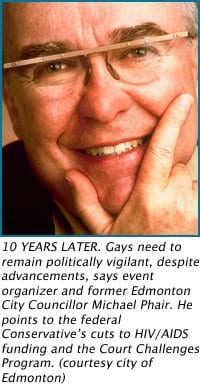Apr 2 marked the 10th anniversary of the Supreme Court of Canada’s landmark decision Vriend vs Alberta.
The now famous court case was the culmination of a legal battle between Delwin Vriend, who lost his job because of his sexual orientation, and the Government of Alberta, which would not accept sexual orientation as a prohibited ground for discrimination in its human rights legislation.
Queer leaders in Edmonton are marking the occasion they call “Alberta’s Stonewall” by gathering at Edmonton City Hall on Sun, Apr 6 for a public dialogue and reception with Vriend. Vriend, who currently lives in Paris, France will be joined by local human rights advocate Murray Billet and Lyle Kanee from the Canadian Jewish Congress. Paula Simons from the Edmonton Journal will moderate the event.
The event promises to share some of the insider perspectives from those involved on the frontlines of the legal battle as well as discuss the impact of the Vriend decision on the citizens of Alberta.
One of the event organizers is prominent gay activist and former Edmonton City Councillor Michael Phair, who believes the reasons to mark this anniversary are three-fold.
“Firstly, it acknowledges the 25-30 year history in Alberta of different groups and organizations across the province pushing the Alberta government to change legislation to have gays and lesbians protected.”
“Secondly, the Vriend case really did just that, and changed the legislation, which effectively ended the provincial government’s ability to discriminate. They wouldn’t allow gays and lesbians to adopt or have foster children, same-sex couples couldn’t share health care benefits or, of course, get married.”
“And finally, what we are seeing now is that people in the [queer] community are putting their efforts into such things such as a queer arts festival, are working with education in schools, supporting our youth — in fact the whole social realm is now something that can be addressed.”
In contrast, the 1990s in Alberta were a time of extreme social tension and moral outrage between the queer community and the community at large. For example, public arts funding for anything queer was threatened. As well, the Alberta Human Rights commissioner was sacked for concluding that queers did indeed deserve to be protected from discrimination. Most of that decade was presided over by a blustery intolerant leader, then-Premier Ralph Klein. But on Apr 2, 1998, the nation’s highest court ruled against the province’s appeal court decision.
“I remember the immediate rally and goodwill with the verdict,” Phair recalls.
“People were very celebratory, but over the next few days things began to darken substantially with the backlash. I, and many others were caught in the maelstrom that occurred for about a week after the decision. Because I was an out public figure there had been some death threats and extra security had to be called in. It was not until Klein finally accepted the decision and said that he wouldn’t use the notwithstanding clause that things settled down.”
With respect to human rights, Phair is currently concerned about the federal Conservatives.
“I think as a community we have to remain politically vigilant,” he says. “The federal government has cut funding for community HIV/AIDS programs as well as the Courts Challenges Program for Charter equality cases which fortunately at the time was a source of support for Delwin’s case.”
Vriend vs. Alberta: Dialogues With Delwin
Sun, Apr 6, 2008
Edmonton City Hall
1:30 – 3:30 PM
Sponsored by:
The University of Alberta’s Institute of Sexual Minority Studies and Services & Exposure: Edmonton’s Queer Arts & Culture Festival.


 Why you can trust Xtra
Why you can trust Xtra


